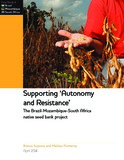Supporting 'Autonomy and Resistance' : the Brazil-Mozambique-South Africa native seed bank project
| dc.contributor.author | Suyama, Bianca | |
| dc.contributor.author | Pomeroy, Melissa | |
| dc.coverage.spatial | Brazil | en |
| dc.coverage.spatial | Mozambique | en |
| dc.coverage.spatial | South Africa | en |
| dc.date.accessioned | 2016-12-21T14:49:43Z | |
| dc.date.available | 2016-12-21T14:49:43Z | |
| dc.date.issued | 2014-04 | |
| dc.identifier.citation | Suyama, B. and Pomeroy, M. (2014) Supporting 'Autonomy and Resistance' : the Brazil-Mozambique-South Africa native seed bank project, Case Study 4, Brighton: IDS. | en |
| dc.identifier.uri | https://opendocs.ids.ac.uk/opendocs/handle/20.500.12413/12720 | |
| dc.description.abstract | This case study explores an innovative multi-stakeholder project led civil society in three countries: Brazil, Mozambique and South Africa. The “community native seeds banks in family farming areas” knowledge-sharing initiative is the first Brazilian South-South Cooperation (SSC) project to be delivered by social movements working in coalition with an NGO and two different government agencies. The project has the overall objective of contributing to the economic and organisational strengthening of family farming in South Africa and Mozambique. Guided by the concept of food sovereignty and practices of agroecology, the project promotes the exchange of experiences between family farmers, technicians and rural leaders to rescue, use and multiply native seeds, and establish community native seed banks. The project was first propelled and mobilised by IBASE, an NGO known for its work in democracy, food sovereignty and alterative development models, with the support of the Presidency General Secretariat (SG-PR). The Brazilian Cooperation Agency (ABC) provides funding and overall management of the project. The Women’s Peasant Movement (MMC) and the Popular Peasant Movement (MPC), both with extensive experience in establishing native seed banks and fairs in Brazil, are responsible for carrying out the capacity building with the support of two agronomists. African civil society partners, responsible for project implementation, include in Mozambique the national peasant movement organization UNAC and in South African six NGOs affiliated with TCOE (the Trust for Community Outreach and Education). The Seed Bank project aimed to counter a dominant agribusiness model of development, presenting an agricultural development alternative that allowed farmers to choose their own agricultural practices and increase their autonomy. Methodologically, the project is based on popular education and intercultural dialogue, ensuring mutual respect in regards to the diversity of knowledge and traditional wisdom existent in the different countries. Cooperation was facilitated through several dialogue and networking events, including the People’s Dialogue (established in 2004), and in 2009, the “Africa-Brazil: Social Participation and International Cooperation” programme. | en |
| dc.language.iso | en | en |
| dc.publisher | Institute of Development Studies | en |
| dc.relation.ispartofseries | Case Study;4 | |
| dc.rights | this is an Open Access publication distributed under the terms of the Creative Commons Attribution License, which permits unrestricted use, distribution, and reproduction in any medium, provided the original author and source are clearly credited. | en |
| dc.rights.uri | http://creativecommons.org/licenses/by/4.0/ | en |
| dc.subject | Agriculture | en |
| dc.title | Supporting 'Autonomy and Resistance' : the Brazil-Mozambique-South Africa native seed bank project | en |
| dc.type | Series paper (non-IDS) | en |
| dc.rights.holder | © Institute of Development Studies / Articulação SUL 2014 | en |
| dc.identifier.externaluri | http://www.cso-ssc.org/ | en |
| dc.identifier.team | Business, Markets and the State | en |
| dcterms.dateAccepted | 2014-04 | |
| rioxxterms.funder | Default funder | en |
| rioxxterms.identifier.project | Default project | en |
| rioxxterms.version | VoR | en |
| rioxxterms.funder.project | c941507f-fd0b-4fc3-9822-4b2132f61a1d | en |
Files in this item
This item appears in the following Collection(s)
Except where otherwise noted, this item's license is described as this is an Open Access publication distributed under the terms of the Creative Commons Attribution License, which
permits unrestricted use, distribution, and reproduction in any medium, provided the original author and source are
clearly credited.


